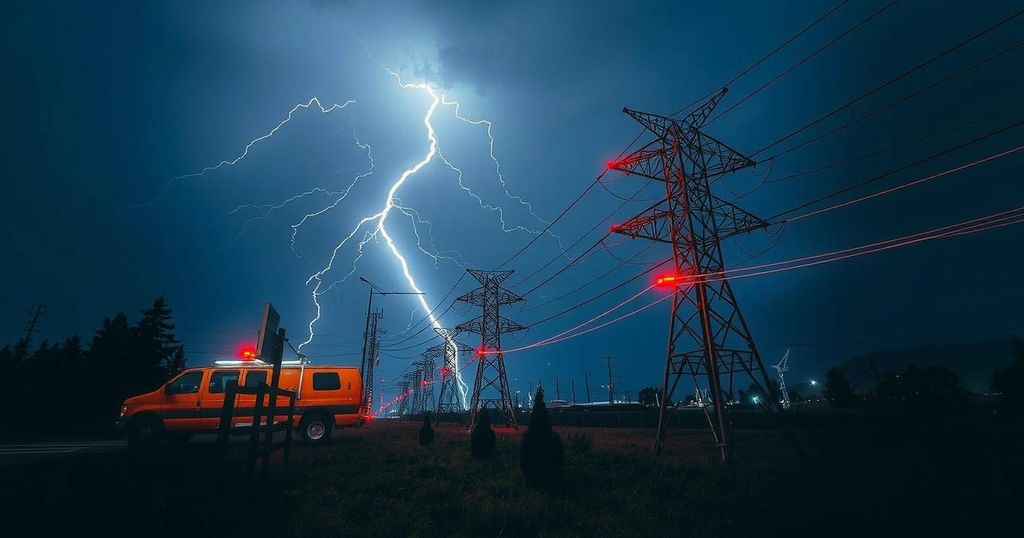Bomb Cyclone Exposes Major Weaknesses in Washington’s Energy Grid
The bomb cyclone in Western Washington disrupted power for over 500,000 residents, revealing significant weaknesses in the electrical grid. Experts stress urgent upgrades as demand for electricity surges amid a shift towards renewable energy sources. Long outages highlighted poor communication and resource shortages among utility companies. Improved infrastructure and renewable energy investments are essential to enhance grid resilience against future severe weather events.
The recent bomb cyclone that struck Western Washington disrupted power for approximately half a million residents, revealing significant vulnerabilities in the Pacific Northwest’s electrical grid. As powerful winds felled trees onto power lines, the subsequent damage necessitated extensive repairs, leaving many without electricity for days. Experts have highlighted the urgent need for substantial upgrades to the grid, particularly as utilities strive to transition away from fossil fuels towards renewable energy sources due to state mandates requiring carbon neutrality by 2045. Experts like Nancy Hirsh emphasize the necessity for an overhaul of the system. Furthermore, Washington’s electricity demand is surging, exacerbated by challenges in hydropower generation and inadequate renewable energy integration.
Meteorologists mentioned that while this specific storm was not attributed to climate change, the increase in extreme weather events associated with global warming is causing greater electricity demand, which may soon surpass supply. This emphasizes the importance of enhancing grid reliability to accommodate frequent severe weather conditions. The impact of the cyclone was felt acutely across the region, with up to 53,000 residents relying on electricity for critical medical equipment, making power outages potentially life-threatening. Consequently, approximately 170,000 households in King County were left without power for extended periods.
The prolonged outages were partially attributed to the nature of the storm’s winds which caused widespread destruction across several areas. With communication issues reported between utility companies and emergency management, response efforts were hampered, underscoring the critical need for better coordination in emergency situations. The lack of available manpower to conduct repairs further complicated recovery efforts, as utility crews are severely under-resourced.
Ultimately, stakeholders have called for an increase in renewable energy capacity and improved localized energy solutions, such as battery storage and microgrid systems, to bolster resilience against future outages. A fundamental reevaluation of energy practices and investment in new technologies is seen as essential in mitigating similar disruptions. According to Meade, a significant shift must occur to ensure the transitions remain forward-focused, avoiding complacency with fossil fuel dependency, which may exacerbate severe weather events.
Washington utilities are urged to innovate and adapt quickly in order to maintain reliable energy service in light of changing climate conditions and increasing demand for electricity. Efforts to retire fossil fuel plants must be matched with a significant increase in renewable sources to prevent future power outages and ensure system stability.
The relevance of the bomb cyclone event lies in its capacity to illustrate systemic weaknesses in Washington’s energy infrastructure. As climate change enhances the frequency and severity of weather events, power grids must adapt to ensure reliability and safety. Experts advocate for modernization of the grid that accommodates more renewable resources, as the existing reliance on aging infrastructure cannot withstand the projected increases in electricity demand or the impacts of extreme weather. The shift mandated by state law requires utilities to move away from fossil fuels, motivating the further necessity for innovative energy solutions that can address both recovery from outages and long-term energy sustainability.
In conclusion, the fallout from the recent bomb cyclone in Western Washington has exposed the critical deficiencies within the region’s electrical grid, necessitating immediate attention to upgrades and improvements. As climate change is likely to amplify the severity and frequency of storms, it becomes imperative to enhance both grid resilience and communication among utilities and emergency management agencies. If the state is to meet its ambitious carbon-neutral goals and effectively respond to future challenges, substantial investments in renewable energy and innovative technologies will be essential to ensure reliable power access for all residents.
Original Source: www.seattletimes.com




Post Comment